
“I Am Not His Secretary”: Guy Outsmarts Micromanaging Boss, Makes Him Do More Work While He Does Less
InterviewEvery team needs a leader. But the truth is when it comes to the workplace environment, this is not always the case. Very often the opposite happens as employees have to deal with manipulative and controlling bosses who view their staff as pawns, simply a “pair of hands” to get work done.
This is what happened to Redditor Sixuldv8, who said that his boss was pretty good until the point he became too micromanaging. In fact, “Where I used to be able to do my job I can no longer do it without constant interruptions of micromanagement,” he wrote. And that includes everything from business calls to various different interruptions of the staff’s workflow.
At one point the author of the post on the r/PettyRevenge subreddit realized he’d had enough and, with a simple trick, made the boss taste his own medicine.
“There’s a number of reasons why this style of management might occur and it’s worthy of understanding,” Dawn Moss, the founder of “Your Interview Coach” who has been helping both candidates and hiring managers through the recruitment and selection process since 2013, told Bored Panda in an interview. Scroll down to see her insights below.
This employee had enough of his controlling boss that constantly interrupted his workflow, so he taught him a lesson

Image credits: Andrea Piacquadio (not an actual photo)
Image credits: David Hahn (not an actual photo)
Image credits: cottonbro (not an actual photo)
Dawn explained that “the typical path to management is working up from being a team member, for example, a hands-on role, to being the technical expert and then being promoted to managing a team. In this case, they are the technical expert in their field but not necessarily experienced in the people management.” This usually results in issues with delegating tasks and/or trusting others to do the tasks, she added.
“It may be that the person is controlling and wants to know every little detail. After all, they are ultimately responsible for productivity and results. They may feel under pressure and want to know what’s going on at all times.”
It turns out that micromanaging can be quite a common occurrence in large and small businesses and there are several disadvantages to this style, Dawn told us. They are as follows: Lack of trust within the team, which can lead to a demotivated team as they feel like they have no autonomy; Limited opportunities for development for the team members as tasks are not delegated adequately; The manager may find themselves overworked and potentially stressed with the volume of work; Increased absenteeism and staff turnover; A team that are either not equipped or trained or confident at making decisions; Employees constantly gaining approval and therefore, dependent on the manager, asking lots more questions, and needing more management time…” The last disadvantage is that it could prevent or stifle learning or creative thinking, Dawn said.
And this is what people had to say about this whole situation
A manager told me, "I hire good people and stay the f**k out of their way." They do occasionally check in, but trust employees to govern themselves. On the other hand, it was a bit of a challenge to adapt to technicians. Technicians tend to want details in writing, because they don't want to guess what people want, they need to be precise in their work, and they don't want to get blamed if someone gave them imprecise instructions. Having to troubleshoot is fine, having to read minds is not. Rant over, LOL. I do both technical work and work that requires creative thinking.
When someone wants details in writing its partially because they're covering their ass with a paper trail. Odds are it means they've had that bad manager before. Probably more than once.
Load More Replies...I have a related but slightly different problem. Working in a very small team, both remote (no office), boss is great in many ways, but older, clearly has no email management skills, and is tech-averse in certain things. So it's a regular parade of "I lost x, can you re-send?" "I can't find x doc on the shared drive, can you link it for me?" etc etc. I try to teach him how to fish and not just give him fish every time; sometimes it sticks but often it doesn't. I'm paid well (for part time) but it's because I have niche skills for this particular job and having to hold his hand - and remember what I sent him to follow up on since he'll inevitably miss important messages - just wastes my time - and I'm paid a flat fee, not by the hour, so it's not like doing this extra stuff puts more $ in my pocket. I NEVER want to be so helpless as I get older so am trying to make sure I keep learning and keeping up with new tech, etc.
Could you write it down for him? Or would he be insulted
Load More Replies...This, I wish I had this skill. I used to do 5x my own work and get insulted for now doing my own job good enough. I wish I'd had the knowledge and guts to do what the OP did.
A manager told me, "I hire good people and stay the f**k out of their way." They do occasionally check in, but trust employees to govern themselves. On the other hand, it was a bit of a challenge to adapt to technicians. Technicians tend to want details in writing, because they don't want to guess what people want, they need to be precise in their work, and they don't want to get blamed if someone gave them imprecise instructions. Having to troubleshoot is fine, having to read minds is not. Rant over, LOL. I do both technical work and work that requires creative thinking.
When someone wants details in writing its partially because they're covering their ass with a paper trail. Odds are it means they've had that bad manager before. Probably more than once.
Load More Replies...I have a related but slightly different problem. Working in a very small team, both remote (no office), boss is great in many ways, but older, clearly has no email management skills, and is tech-averse in certain things. So it's a regular parade of "I lost x, can you re-send?" "I can't find x doc on the shared drive, can you link it for me?" etc etc. I try to teach him how to fish and not just give him fish every time; sometimes it sticks but often it doesn't. I'm paid well (for part time) but it's because I have niche skills for this particular job and having to hold his hand - and remember what I sent him to follow up on since he'll inevitably miss important messages - just wastes my time - and I'm paid a flat fee, not by the hour, so it's not like doing this extra stuff puts more $ in my pocket. I NEVER want to be so helpless as I get older so am trying to make sure I keep learning and keeping up with new tech, etc.
Could you write it down for him? Or would he be insulted
Load More Replies...This, I wish I had this skill. I used to do 5x my own work and get insulted for now doing my own job good enough. I wish I'd had the knowledge and guts to do what the OP did.

 Dark Mode
Dark Mode 

 No fees, cancel anytime
No fees, cancel anytime 



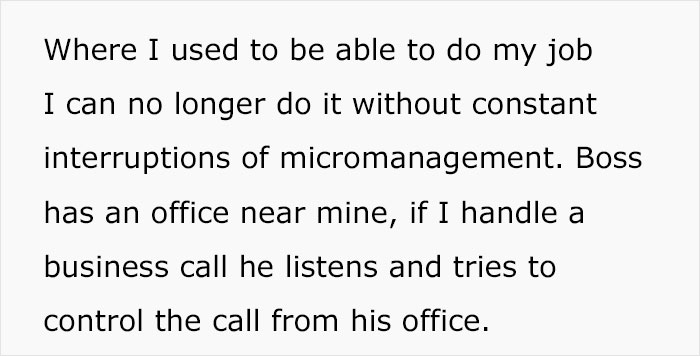




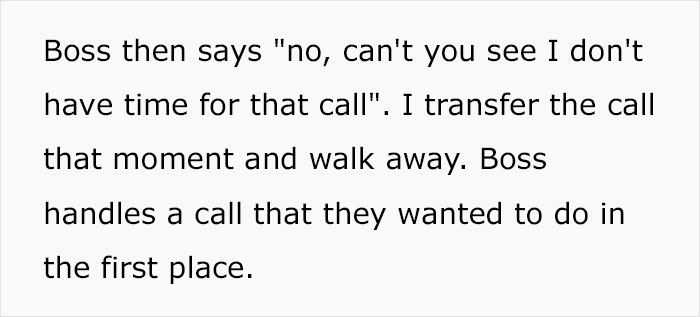
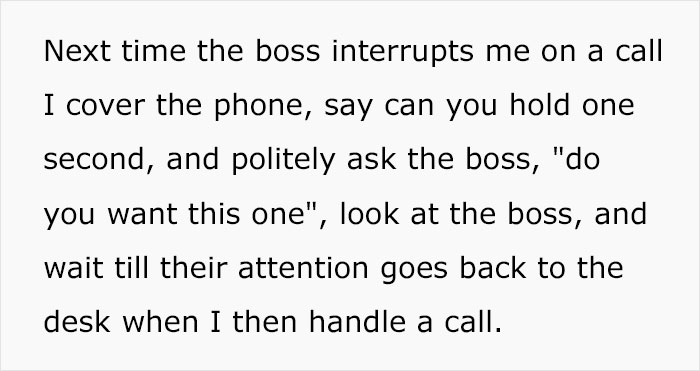
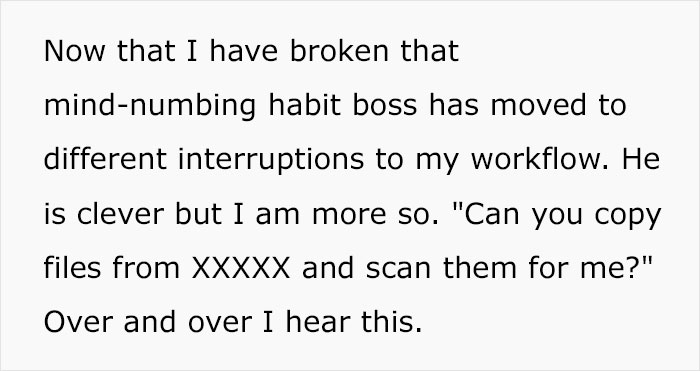
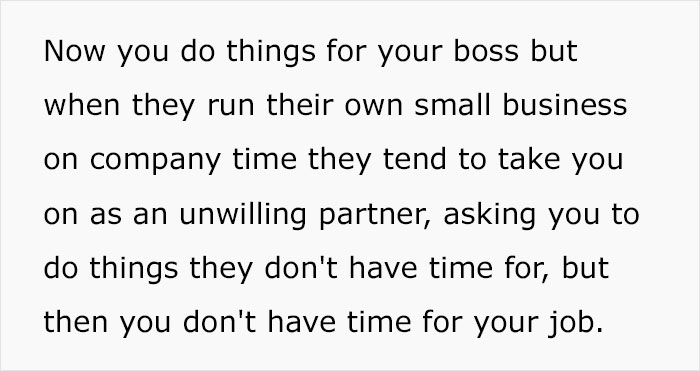

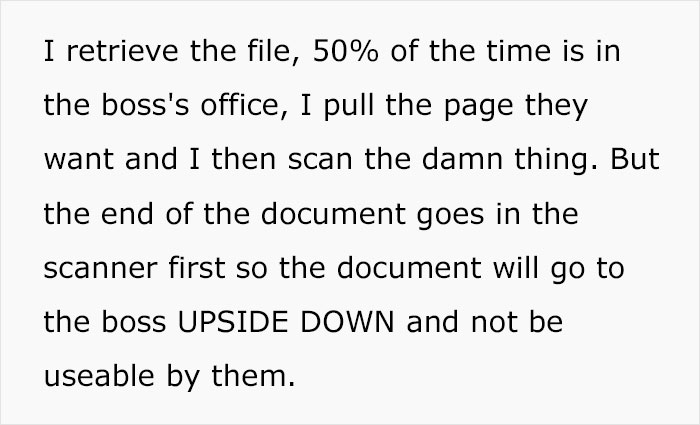


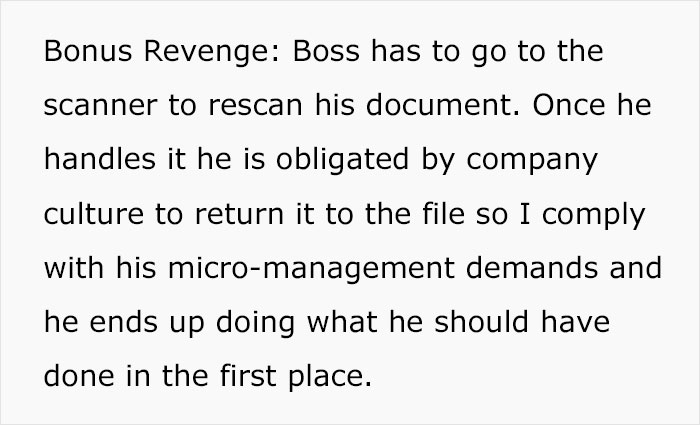
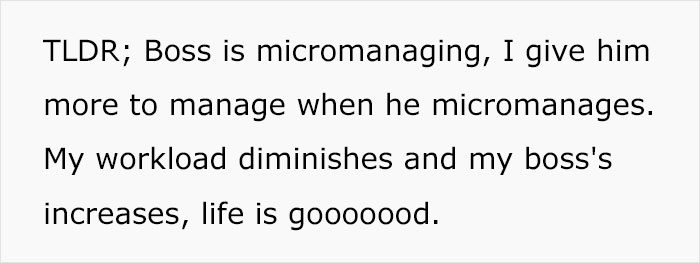



















































100
36